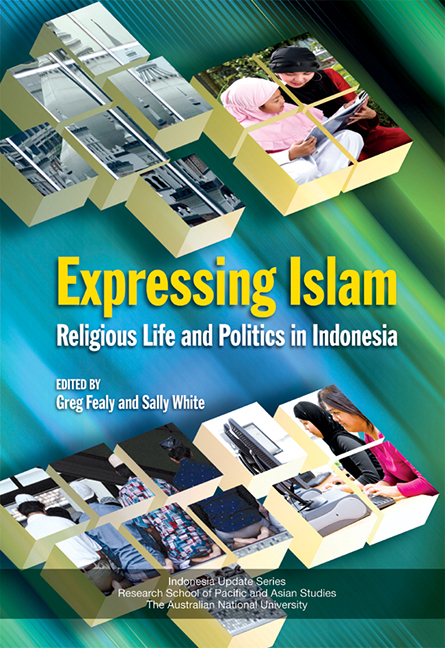Book contents
- Frontmatter
- Contents
- List of Figures and Tables
- List of Contributors
- Acknowledgments
- Glossary
- Map
- 1 Introduction
- PART I EXPRESSING PERSONAL PIETY
- 2 Consuming Islam: Commodified Religion and Aspirational Pietism in Contemporary Indonesia
- 3 Modulations of Active Piety: Professors and Televangelists as Promoters of Indonesian ‘Sufisme’
- 4 Throwing Money at the Holy Door: Commercial Aspects of Popular Pilgrimage in Java
- 5 ‘Spiritual Meal’ or Ongoing Project? The Dilemma of Dakwah Oratory
- 6 Marketing Morality: The Rise, Fall and Rebranding of Aa Gym
- PART II POLITICAL, SOCIAL AND LEGAL EXPRESSIONS OF ISLAM
- PART III THE ISLAMIC ECONOMY
- Index
- Indonesia Update Series
- Plate section
5 - ‘Spiritual Meal’ or Ongoing Project? The Dilemma of Dakwah Oratory
from PART I - EXPRESSING PERSONAL PIETY
Published online by Cambridge University Press: 21 October 2015
- Frontmatter
- Contents
- List of Figures and Tables
- List of Contributors
- Acknowledgments
- Glossary
- Map
- 1 Introduction
- PART I EXPRESSING PERSONAL PIETY
- 2 Consuming Islam: Commodified Religion and Aspirational Pietism in Contemporary Indonesia
- 3 Modulations of Active Piety: Professors and Televangelists as Promoters of Indonesian ‘Sufisme’
- 4 Throwing Money at the Holy Door: Commercial Aspects of Popular Pilgrimage in Java
- 5 ‘Spiritual Meal’ or Ongoing Project? The Dilemma of Dakwah Oratory
- 6 Marketing Morality: The Rise, Fall and Rebranding of Aa Gym
- PART II POLITICAL, SOCIAL AND LEGAL EXPRESSIONS OF ISLAM
- PART III THE ISLAMIC ECONOMY
- Index
- Indonesia Update Series
- Plate section
Summary
One could be forgiven for thinking that there is no limit to the broad usage Indonesians make of the term dakwah, which literally means ‘call’ (to religion), and is commonly extended to mean any kind of preaching, predication or Islamic outreach activity. Many activities without primarily religious meaning are described as dakwah, including performance of one's vocation and family duties, conduct of a commercial enterprise and various kinds of artistic expression. In fact, this broad understanding is completely in harmony with Islamic teachings on dakwah. Islam's normative sources make dakwah a compulsory activity for all Muslims, and the particular form to be practised should be one that is suitable to the talents, capacities and circumstances of individual Muslims. Nevertheless, at times the concept of dakwah entails surprising connections between daily life and religious meaning. A recent newspaper article reporting on the phenomenon of majlis taklim, the salon-style religious discussion groups currently popular among middle and upper-class women in Bandung, included a description by one member of the diverse activities performed by her majlis taklim. ‘A fashion show is also dakwah!’ (Fashion show itu juga dakwah!), the woman said.
Notwithstanding the ever-widening use of the term, there is one activity that has a strong claim to be regarded as the original or authentic dakwah activity, and that is oratory or dakwah bil-lisan (literally, ‘dakwah with the tongue’). Oratory is, to varying degrees, a central element in a number of activities that have evolved within the Indonesian Islamic tradition, including ‘great preaching’ (tabligh akbar)—that is, preaching to large audiences from a stage—study groups (pengajian), advice evenings (malam tausiyah) and discussion evenings (malam diskusi). The common characteristic of all these events is that the space is divided into two distinct zones: one to accommodate the preacher—the dai, muballigh or pendakwah— and the other to accommodate the listeners.
The status of oratory as the authentic form of dakwah is confirmed by the everyday use of the terms dai and pendakwah. These are cognate terms, both derived from ‘dakwah’. Only orators are described with these terms. No one would question the correctness of a painter, for example, choosing to describe his or her work as dakwah.
- Type
- Chapter
- Information
- Expressing IslamReligious Life and Politics in Indonesia, pp. 80 - 94Publisher: ISEAS–Yusof Ishak InstitutePrint publication year: 2008

